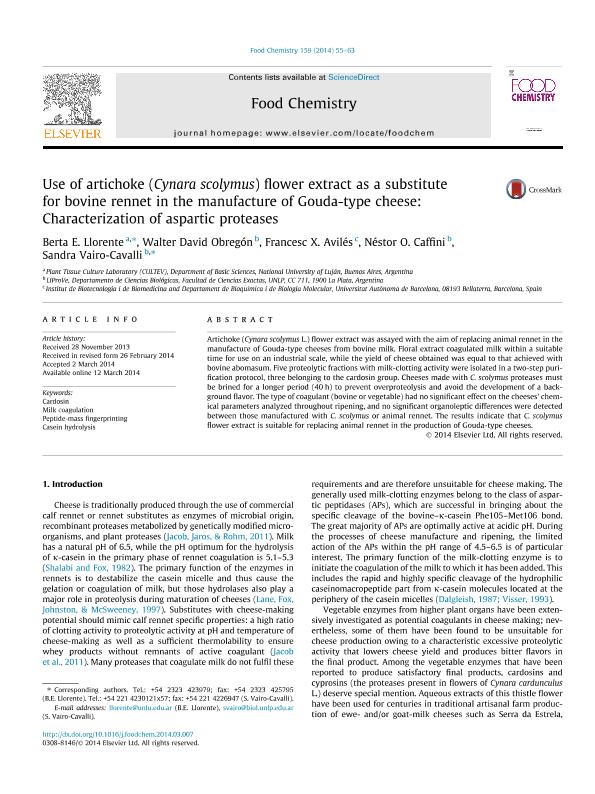Artículo
Use of artichoke (Cynara scolymus) flower extract as a substitute for bovine rennet in the manufacture of Gouda-type cheese: Characterization of aspartic proteases
Llorente, Berta Elizabet; Obregon, Walter David ; Avilés, Frances X.; Caffini, Nestor Oscar; Vairo Cavalli, Sandra Elizabeth
; Avilés, Frances X.; Caffini, Nestor Oscar; Vairo Cavalli, Sandra Elizabeth
 ; Avilés, Frances X.; Caffini, Nestor Oscar; Vairo Cavalli, Sandra Elizabeth
; Avilés, Frances X.; Caffini, Nestor Oscar; Vairo Cavalli, Sandra Elizabeth
Fecha de publicación:
09/2014
Editorial:
Elsevier
Revista:
Food Chemistry
ISSN:
0308-8146
Idioma:
Inglés
Tipo de recurso:
Artículo publicado
Clasificación temática:
Resumen
Artichoke (Cynara scolymus L.) flower extract was assayed with the aim of replacing animal rennet in the manufacture of Gouda-type cheeses from bovine milk. Floral extract coagulated milk within a suitable time for use on an industrial scale, while the yield of cheese obtained was equal to that achieved with bovine abomasum. Five proteolytic fractions with milk-clotting activity were isolated in a two-step purification protocol, three belonging to the cardosin group. Cheeses made with C. scolymus proteases must be brined for a longer period (40 h) to prevent overproteolysis and avoid the development of a background flavor. The type of coagulant (bovine or vegetable) had no significant effect on the cheeses’ chemical parameters analyzed throughout ripening, and no significant organoleptic differences were detected between those manufactured with C. scolymus or animal rennet. The results indicate that C. scolymus flower extract is suitable for replacing animal rennet in the production of Gouda-type cheeses.
Palabras clave:
Cardosin
,
Milk Coagulation
,
Peptide-Mass Fingerprinting
,
Casein Hydrolysis
Archivos asociados
Licencia
Identificadores
Colecciones
Articulos(CCT - LA PLATA)
Articulos de CTRO.CIENTIFICO TECNOL.CONICET - LA PLATA
Articulos de CTRO.CIENTIFICO TECNOL.CONICET - LA PLATA
Citación
Llorente, Berta Elizabet; Caffini, Nestor Oscar; Vairo Cavalli, Sandra Elizabeth; Avilés, Frances X.; Obregon, Walter David; Use of artichoke (Cynara scolymus) flower extract as a substitute for bovine rennet in the manufacture of Gouda-type cheese: Characterization of aspartic proteases; Elsevier; Food Chemistry; 159; 9-2014; 55-63
Compartir
Altmétricas



